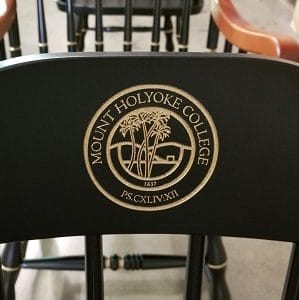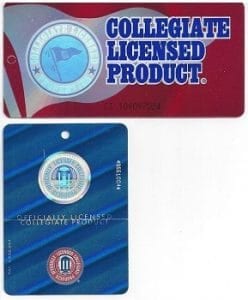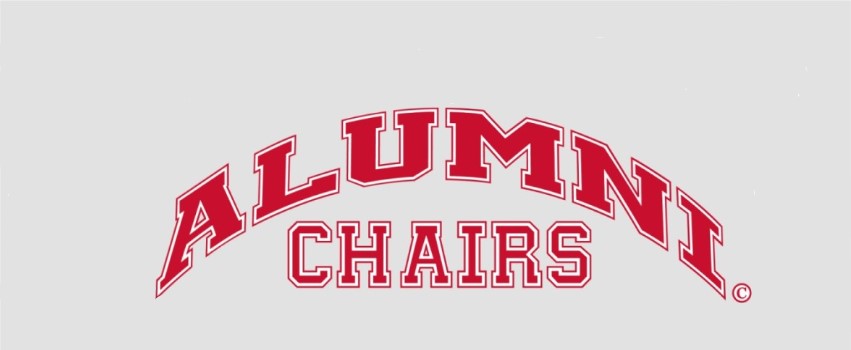Trademarks and Royalties for College Chairs

WHAT IS A TRADEMARK?
A trademark is any logo, symbol, nickname, letter(s), word, slogan, or derivative that can be associated with an organization, company, manufacturer, or institution and can be distinguished from those of other entities or competitors.
As defined by the US Patents & Trademarks Office, “a trademark is a word, phrase, symbol or design, or a combination of words, phrases, symbols or designs, that identifies and distinguishes the source of the goods of one party from those of others.” A trademark need not be registered in order to have protectable rights to it, simply by using or displaying a mark acquires automatic trademark rights to the owner.

WHY IS A LICENSE NECESSARY?
A license is a written legal agreement between the owner of the trademark (licensor) and a manufacturer/vendor (licensee). The licensor grants permission to the licensee to affix the licensor’s trademark(s) on a product(s). This license must be in place before use of the institution’s marks.
Collegiate product Licenses are often required for the use of many trademarks, images, or photographs used on products sold to the general public or to campus departments and organizations. In addition, promotional licenses must be obtained by companies or organizations wanting to associate with many colleges and universities through any use of the pertinent trademarks.
A licensing program exists to protect the name and marks of the institution and to enhance the image of the institution through the signing of licensing agreements authorizing the use of the marks on high quality and tasteful merchandise. It is also the responsibility of the office to insure that the institution receives the appropriate commercial value for the use of its trademarks on College Chairs.
In order to produce a college chair representing your college or university, Alumni Chairs may be required to obtain a license or explicit permission before offering the product/goods for sale, that display the pertinent trademarks. Sales of collegiate chairs to college and university departments, campus organizations, and student-recognized organizations are generally exempt from such licensing requirements.
Alumni Chairs wants our client to be aware that the process of gaining college and university permissions and obtaining the necessary art (seal or logo) can take some time. Often, schools will respond immediately, but it is not uncommon that weeks may pass as we wait for a response from these institutions. The timing is not something over which we have control.
PURPOSE
Trademark licensing personnel steward their respective brands through protection and promotion to generate assets in support of each institution’s goals and objectives. Authorized by leadership, trademark licensing personnel serve the university by managing the commercial use of the institution’s name and institutional symbols, providing revenues that support operations, promotion of the institution’s name and goodwill, and, in the case of academic institutions, support of academics, scholarships, and athletics.
In most large academic institutions, control of trademarks, licensing, and branding are controlled by a trademark licensing department, communications and marketing, the office of the president, or the bookstore. Many colleges and universities rely on independent agents to control and distribute trademarks and identifying marks of the university, including the name and logos.
A trademark licensing program exists to protect the name, maintain historically significant and important symbols and marks of the institution, and to enhance or maintain a positive image of the institution through the signing of licensing agreements authorizing the use of the marks on high quality and tasteful merchandise. It is also the responsibility of the office to insure that the institution receives the appropriate commercial value for the use of its trademarks.
TRADEMARK LICENSING CAN QUALIFY AND CONTROL ACCESS TO PRODUCTS
Many colleges, universities, non-profits, and businesses in North America have established and carefully maintain strict procedures for protecting the value of their intellectual property including their highly valuable logos, insignia, official seals, and nearly any image of or representing the institution. Approximately twenty (20-30) large universities maintain internal legal departments or trademark licensing departments that ensure compliance with university procedures internally and among companies that manufacture products bearing the trademarked and otherwise protected images. Even a casual private photograph of a college campus is considered the intellectual property of most universities.
Alumni Chairs is licensed by national licensing agencies in order to gain access to the trademarks of leading colleges, universities, athletic conferences, and athletic events. These include large institutions that license independently of the leading licensing/marketing agencies.
The trademark licensing and marketing firms represent the interest of institutions, process applications by companies offering products, vet each company, enforce insurance requirements, scrutinize all products, receive royalty fee payments, remit royalties to client schools, process contracts between companies and colleges, monitor from compliance of the affiliated companies, and enforce trademark licensing policies on behalf of their client institutions.
HANGTAGS FOR OFFICIAL COLLEGIATE PRODUCTS
Alumni Chairs and other manufacturers of collegiate products must demonstrate compliance with licensing requirement of each institution in order to protect the branding or identity of the institutions. These schools and organizations identify their protected trademarks that are installed in or applied to commercial products via special hangtags or labels. These identifying tags and labels are required for these products to ensure that the products are officially licensed. Alumni Chairs tags each official collegiate chair with a visible Collegiate Licensed Product Hangtags and Licensed Collegiate Product Hangtags for clear and easy identification.

BENEFITS AND EFFECTS OF LICENSING FEES AND ROYALTY FEES
Licensees like Alumni Chairs are required to pay royalty fees for the permission to reproduce trademarked property (logos) in and on manufactured products that represent colleges and universities. In our case we pay fees to build collegiate chairs. These royalties which are typically paid to trademark and licensing departments are specified within licensing agreements with each institution that is represented. Most of these agreements are predicated on certain assumptions regarding benefits.
The first benefit assumption of the trademark licensing process is that the licensing mechanism ensures a high quality of products that represent an institution. Many colleges and universities generally believe that only the companies that are serious about quality and long term relationships with institutions will be willing to pay the required fees. Also, manufacturers and resellers are aware that, if perceived standards of product quality, social responsibility, and conduct are not met, the companies will lose their privilege of future use of the pertinent trademarks.
The second benefit is that much or all of the resulting revenue goes to scholarship funds at some schools while, at others, moneys are allocated to athletics. Large universities, with budgets in the billions of dollars range, very actively pursue royalty revenues. Of course, some of that revenue is used to support the trademark licensing program, itself. Most academic institutions demand fees in the form of “royalty advances”. Nearly all schools simply keep the unused portion of the advances – a popular source of income.
Many buyers of collegiate chairs are unaware of the demands for product sales at their own alma maters. Sales of collegiate chairs provide significant revenues to athletic, scholarship, and general funds through these licensing programs. College Chairs are treated slightly differently from T-shirts, sweatshirts, and other apparel by virtue of both royalty rates and advance payments. Apparel are normally met with higher fees. When one wonders about a surprisingly high price of a college product, one should consider the probability that a large portion of the retail price will fund various programs at the corresponding college or university.
The necessary royalty fee payments to the institution, specified by trademarks and licensing may lead to price increases in collegiate products. Non-apparel products including chairs typically justify royalty fees from 10% to 15% of final invoice price. Apparel products are typically assigned higher rates. Also, most universities require advance payments that vary from $50 (either one-time or per year) for small schools up to $2,000 in advance for more “prestigious” universities. One can see, immediately, what these fees can do to the prices of collegiate chairs.
Recently, there has been a trend among colleges and universities in the U.S. is to raise royalty rates. Many small schools have recently increased rates from 8% and 10% to 10% and 12%, and some larger institutions have raised their rates up to 18%. As royalty rates creep higher and higher, prices of collegiate chairs are necessarily increased by manufacturers and retailers. There are a few, very exceptional universities that ask only a royalty fee with no advances.
While some chair manufacturers resort to manufacturing overseas in order to maintain high margins and still offer competitive prices, Alumni Chairs, builds all of its high-quality chairs in the United States, and combats rising royalty rates and advance fees as much as possible by maintaining significantly lower margins and by holding retail prices as low as possible.
CHAIRS REPRESENTING YOUR FAVORITE INSTITUTION
If you do not see your alma mater specifically listed on this website, you are correct to assume that we may not have a licensing relationship with that school, currently. However, we can likely obtain special permission by your college to make a chair. representing your college or university. We are confident in this because many schools are pleased to have us create a special college chair for their alumni on an exceptional basis, and we are very happy to do this.
In order to produce your college chair we may be required to obtain a license or explicit permission before offering the product/goods for sale, that display the pertinent trademarks. Sales of collegiate chairs to college and university departments, campus organizations, and student-recognized organizations are generally exempt from such licensing requirements.
Please be aware that the process of gaining college and university permissions and obtaining the necessary art (seal or logo) can take some time. Often, schools will respond immediately, but it is not uncommon that weeks pass as we wait for a response from some institutions. Although a timely response by your college is not something over which we have control, we will do our very best to expedite the process of gaining approval.
So, don’t be concerned! We will contact your school and negotiate permissions to make your chair with your school’s official logo and, if permitted, their official seal.
Call us, discuss your ideal chair for your Alma Mater, and learn more about chairs for your college! We will do our best to serve well both you and your college!
For more information about trademark licensing and permission to install a logo or college seal in your chairs, phone Alumni Chairs at 866.748.2230.
